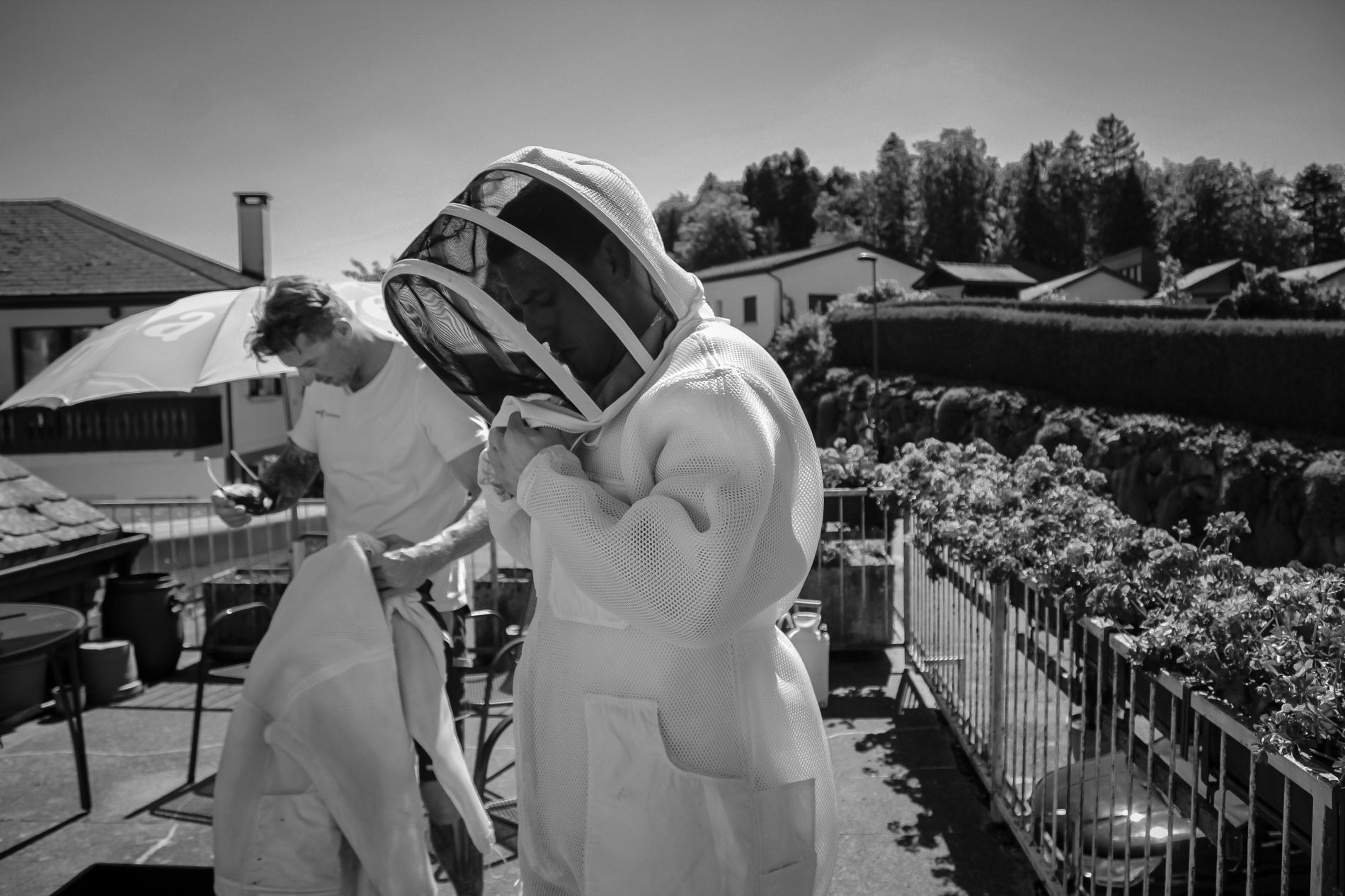
Fighting Asian hornets in Bretzwil
Have you discovered an Asian hornet's nest? We'll be on site quickly! Call now - Daily Mon-Sun 07:00-21:30. Contact us now: 058 510 22 54
Having the Asian hornet's nest removed
Vespa velutina, a hornet species from South-East Asia, has vigorously spread its invasive presence to Switzerland and the entire subcontinent. Even though it lacks hostility towards humans, it has gained notoriety as a relentless hunter of honey bees, which has alarmed beekeepers. A mere few of these hornets can swiftly attack and annihilate an entire bee colony within a few hours. If you have discovered a hornet's nest on your house, patio, shed, or in your blind box, contact our experts for hornet nest removal in Bretzwil!
Use the uncomplicated telephone service of the Hornet experts in Bretzwil and simply inform us at 058 510 22 54, we will be on site quickly so that you and everyone in your area feel completely safe again.
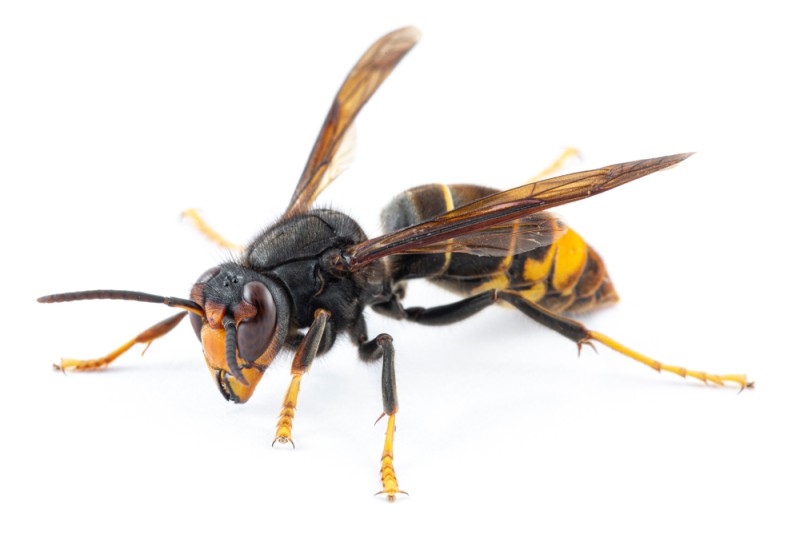

Appearance of the Asian hornet
Here are some characteristics that distinguish the Asian hornet:
1. Size: The queen can reach a length of about 3 cm, while the workers are slightly smaller and measure about 2.5 cm.
2. Color: The Asian hornet has a dark body that is almost black, with a yellow stripe at the back of the abdomen. Its face is orange-yellow.
3. Wings: The wings are dark and almost smoky gray.
4. Legs: The hornet has yellow tips on its legs, which is a striking distinguishing feature when it flies.
5. Nest: The Asian hornet's nest is often high in the trees, but it can also be found underground or in tall structures such as chimneys. It has an oval shape and is made of chewed wood, which gives the hornet a papery texture.
It is important to distinguish the Asian hornet from the European hornet (Vespa crabro), which is more harmless and a natural part of the European fauna. If you suspect you have found an Asian hornet nest near you in Bretzwil, you should report this to the local authorities, or using our reporting form, as they can spread quickly and be harmful to bees and other insects. To avoid being attacked by the flying inhabitants, you should hire a professional pest controller such as the Hornet Experts Bretzwil. We can identify the nest beyond doubt and take further steps to remove the Asian hornets professionally.
News about the Asian hornet in Bretzwil
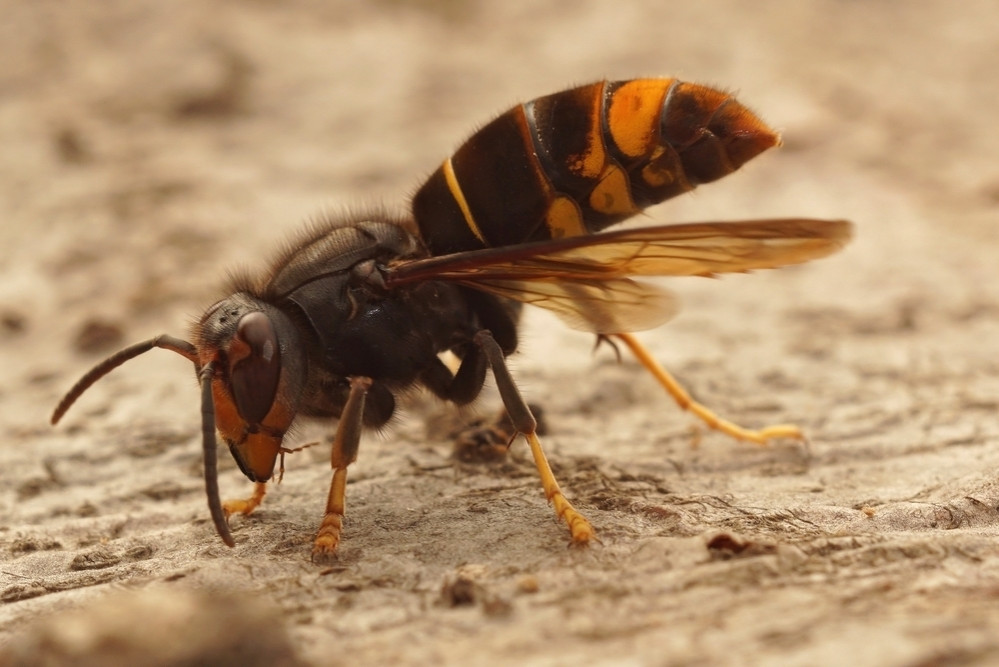
02.12.2025 Western Switzerland: Killer hornet eats bees
The territory of the Asian killer hornet has expanded considerably this year, with a notable increase reported in western Switzerland. This invasive species poses a significant threat to native bee populations, as bees make up the majority of its diet. The potential consequences are serious. Moreover, the hornet represents a danger to individuals with allergies to its venom.
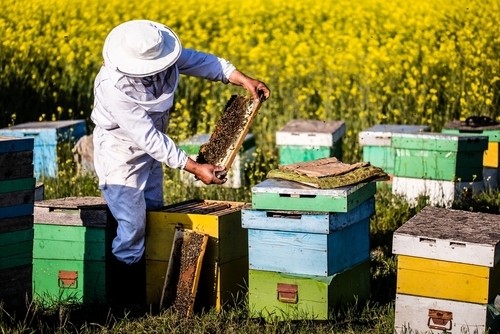
25.11.2025 Serious concerns about the bee population!
Asian hornets are inflicting significant harm on beehives across multiple parts of Europe, as reported by local beekeepers. Even a small number of hornets can destroy an entire bee colony within hours. This sharp decline in pollinators could have serious consequences for pollination, local ecosystems, and agricultural productivity.
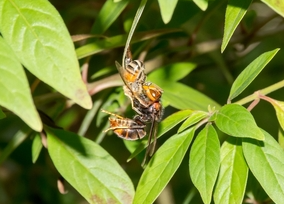
18.11.2025 Asian hornet doesn't just eat bees!
The danger it presents to insects is substantial!
The Asian hornet feeds largely on honeybees—up to 85 percent of its diet—alongside beetles and flies. This high level of predation not only poses difficulties for fruit growers but also further threatens already vulnerable bee populations.
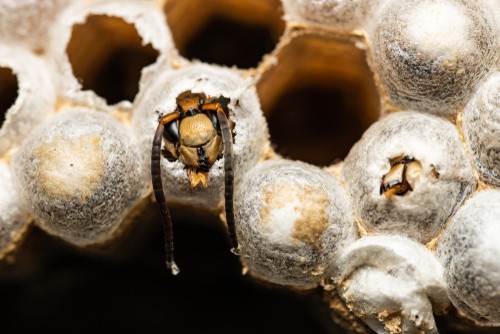
11.11.2025 How did the Asian hornet get to Europe?
The Asian hornet likely arrived in Europe unintentionally and has quickly expanded throughout France and nearby countries. Its adaptability to different environments and the absence of natural predators have contributed to its rapid spread. A single nest can generate several hundred new queens in one breeding season.
Asian Hornet Reporting Form
Please fill out all required fields and submit the form.
Help us!
If you discover an Asian hornet or a nest of this invasive species in Bretzwil, it is of the utmost importance that you report it immediately. The Asian hornet is not only dangerous to humans, but also poses a serious threat to native bee populations and the ecological balance in Switzerland.
Why is it important to report the find?
The Asian hornet's colonization in certain regions significantly affects native insects, with honey bees as the primary target. By preying on bees, these hornets play a role in the decline of pollinator populations, which has repercussions on the local flora and agricultural productivity. By reporting sightings, experts can react quickly, remove the hornets or their nests and thus prevent the spread of this invasive species.
Notification form for sightings
As part of our commitment to regulating the overpopulation of the Asian hornet in Switzerland and protecting our native insect populations, we urge you to utilize our special reporting form to report any suspicions or sightings. Your cooperation is crucial in our endeavor to intervene at an early stage and minimize the spread of this dangerous species in our ecosystems.
Your contribution is crucial in the fight against the Asian hornet in Bretzwil. Together we can protect nature and maintain the balance of our ecosystems;
Thank you for your vigilant attention and your commitment to protecting our environment.
How dangerous is the Asian hornet?
The Asian hornet (Vespa velutina) is a predatory insect that originated in Asia and has spread in recent years to various parts of Europe, including France and now also Switzerland and in Bretzwil. Although it poses a threat to honey bees and native biodiversity, it is generally no more dangerous to humans than other wasp species. Nevertheless, there are some aspects to be aware of:
1. Threat to honey bees: The Asian hornet preys on honey bees, threatening native bee populations. A decline in bees can have a negative impact on pollination and thus on local flora and agricultural production.
2. Stings: As with other wasp and hornet species, the stings of the Asian hornet can also be painful. For most people, the stings are unpleasant but not dangerous. However, people who are allergic to wasp or hornet stings can suffer a severe allergic reaction, which in the worst case can lead to anaphylactic shock.
3. Aggressiveness: Although the Asian hornet is not necessarily more aggressive towards humans than other wasp species, it can become aggressive if it feels threatened, especially near its nest.
4. Ecological effects: Apart from the direct effects on honey bees, the spread of the Asian hornet can also disturb the ecological balance by affecting the populations of other insects.
To avoid confusion, it is important to note the distinction between the Asian hornet and the larger Asian giant hornet (*Vespa mandarinia*), which is often referred to as the "killer hornet." The giant hornet poses a potentially greater danger to humans due to its more powerful venom and the size of its sting.
If you have discovered a nest, call us immediately: 058 510 22 54
Our hornet professionals in Bretzwil are certified by the VSS.
Frequently Asked Questions About Asian Hornets in Bretzwil
The Asian hornet should be noted for its potential to deliver stings that can result in potentially serious or even fatal outcomes. It surpasses the inherent danger found in most other hornet species.
The Asian hornet is an insect to be reckoned with due to its considerable size, measuring up to 3 cm in length. Its slender, jet-black physique displays a dense coat of vibrant orange, yellow, and black stripes, forming an eye-catching pattern.
The Asian hornet must be approached with great care as its venom is extremely poisonous to humans. The bite of an Asian hornet can cause intense pain and potentially trigger severe allergic responses.
Great care must be taken when encountering the Asian hornet, as its potent toxicity can result in painful bites that have the potential to induce allergic reactions in humans.
The Asian hornet's danger lies in its venomous sting, which is more painful when compared to that of other wasps. Additionally, it can lead to allergic reactions.
In order to report an Asian hornet, it is essential to get in touch with either a regional wild bee protection officer or an agency affiliated with the Ministry of Agriculture that is responsible for handling these concerns.
Promptly reporting Asian hornet sightings is key to preventing attacks and curtailing the insect's proliferation. Their highly territorial and aggressive tendencies necessitate proactive reporting.
Effectively managing the presence of Asian hornets in Switzerland requires professional hornet control. To achieve this, it is advisable to reach out to a trusted pest control service by calling upon their expertise.
No protective measures are in place for the Asian hornet. Consequently, it is necessary to ensure diligent monitoring of their population to impede their range expansion.
While hibernating, the Asian hornet may exhibit two hibernation patterns: collective hibernation, where they hibernate together as a group, or solitary hibernation, seeking shelter in the corners of walls, buildings, garden sheds, incidental structures, or tree hollows.
Would you like more information about Asian hornets? Then take a look at our FAQ's about Asian hornets.
Private inquiry form
For an uncomplicated request to remove an Asian hornet's nest, please use our contact form for private individuals.
Real estate inquiry form
Use our property management order form to request the removal of an Asian hornet's nest.




_22.jpeg)
_20.jpeg)
_22.jpeg)
_23.jpeg)